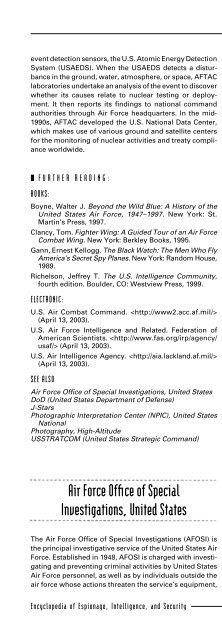ENCYCLOPEDIA OF Espionage, Intelligence, and Security Volume ...
ENCYCLOPEDIA OF Espionage, Intelligence, and Security Volume ...
ENCYCLOPEDIA OF Espionage, Intelligence, and Security Volume ...
You also want an ePaper? Increase the reach of your titles
YUMPU automatically turns print PDFs into web optimized ePapers that Google loves.
Air Force Office of Special Investigations, United Statesevent detection sensors, the U.S. Atomic Energy DetectionSystem (USAEDS). When the USAEDS detects a disturbancein the ground, water, atmosphere, or space, AFTAClaboratories undertake an analysis of the event to discoverwhether its causes relate to nuclear testing or deployment.It then reports its findings to national comm<strong>and</strong>authorities through Air Force headquarters. In the mid-1990s, AFTAC developed the U.S. National Data Center,which makes use of various ground <strong>and</strong> satellite centersfor the monitoring of nuclear activities <strong>and</strong> treaty complianceworldwide.❚ FURTHER READING:BOOKS:Boyne, Walter J. Beyond the Wild Blue: A History of theUnited States Air Force, 1947–1997. New York: St.Martin’s Press, 1997.Clancy, Tom. Fighter Wing: A Guided Tour of an Air ForceCombat Wing. New York: Berkley Books, 1995.Gann, Ernest Kellogg. The Black Watch: The Men Who FlyAmerica’s Secret Spy Planes. New York: R<strong>and</strong>om House,1989.Richelson, Jeffrey T. The U.S. <strong>Intelligence</strong> Community,fourth edition. Boulder, CO: Westview Press, 1999.ELECTRONIC:U.S. Air Combat Comm<strong>and</strong>. (April 13, 2003).U.S. Air Force <strong>Intelligence</strong> <strong>and</strong> Related. Federation ofAmerican Scientists. (April 13, 2003).U.S. Air <strong>Intelligence</strong> Agency. (April 13, 2003).SEE ALSOAir Force Office of Special Investigations, United StatesDoD (United States Department of Defense)J-StarsPhotographic Interpretation Center (NPIC), United StatesNationalPhotography, High-AltitudeUSSTRATCOM (United States Strategic Comm<strong>and</strong>)Air Force Office of SpecialInvestigations, United StatesThe Air Force Office of Special Investigations (AFOSI) isthe principal investigative service of the United States AirForce. Established in 1948, AFOSI is charged with investigating<strong>and</strong> preventing criminal activities by United StatesAir Force personnel, as well as by individuals outside theair force whose actions threaten the service’s equipment,personnel, activities, or security. Its ranks, which numberednearly 2,500 in 2002, include active-duty Air Forcepersonnel, reservists, <strong>and</strong> civilians.Then United States Secretary of the Air Force W.Stuart Symington formed AFOSI on August 1, 1948, as theresult of recommendations by the United States Congressthat the air force (created in 1947) consolidate its investigativeactivities. Symington patterned the new office afterthe Federal Bureau of Investigation (FBI), <strong>and</strong> appointedSpecial Agent Joseph Carroll, assistant to FBI director J.Edgar Hoover, as the first AFOSI chief. Symington <strong>and</strong>Carroll developed an investigative service designed toprovide unbiased information <strong>and</strong> operate independent oftop air force comm<strong>and</strong>. To this end, the AFOSI includedcivilian personnel from the beginning.AFOSI is based on a fourfold mission, intended toprotect the air force from dangers within <strong>and</strong> without. Asstated by AFOSI itself, that mission is to (1) Detect <strong>and</strong>provide early warning of worldwide threats to the AirForce; (2) Identify <strong>and</strong> resolve crime impacting Air Forcereadiness or good order <strong>and</strong> discipline; (3) Combat threatsto Air Force information systems <strong>and</strong> technologies; <strong>and</strong> (4)Defeat <strong>and</strong> deter fraud in the acquisition of Air Forceprioritized weapons systems.Fulfillment of the AFOSI mission. The majority of AFOSIactivities are directed toward the fulfillment of the seconddirective listed above. Among the crimes addressed byAFOSI investigators are murder, robbery, rape, drug use<strong>and</strong> trafficking, black-market activities, <strong>and</strong> other unlawfulacts committed by or against air force personnel. Economiccrime, or fraud, is an area of investigation thatplaces particularly large dem<strong>and</strong>s on AFOSI resources.Additionally, the service is concerned with detecting<strong>and</strong> protecting against outside threats, activities that requireinvestigation of espionage, terrorism, technologytransfer, <strong>and</strong> computer infiltration. In line with the firstdirective in its mission, AFOSI personnel provide personalprotection to senior air force leaders <strong>and</strong> other officials.Within the ranks of AFOSI are also personnel withspecialized missions <strong>and</strong> skills who fulfill functions rangingfrom that of polygrapher to computer expert to behavioralscientist. Other AFOSI agents operate within one ofthree antiterrorism teams, based at Lackl<strong>and</strong> Air ForceBase (AFB) in Texas; Ramstein AFB in Germany; <strong>and</strong>Hickham AFB in Hawaii.Organization, personnel, <strong>and</strong> training. In addition to AFOSIheadquarters, the organization has eight field investigationregions. Of these, seven are tied with major air forcecomm<strong>and</strong>s: materiel (Region 1), air combat (Region 2), airmobility (Region 3), air education <strong>and</strong> training (Region 4),United States Air Forces in Europe (Region 5), Pacific AirForces (Region 6), <strong>and</strong> Air Force Space Comm<strong>and</strong> (Region8). In line with the original vision of AFOSI as an independentunit, these regions report to AFOSI headquarters <strong>and</strong>Encyclopedia of <strong>Espionage</strong>, <strong>Intelligence</strong>, <strong>and</strong> <strong>Security</strong>13







![The Big Lie 9-11 and Government Complicity in Mass Murder [PDF]](https://img.yumpu.com/50957077/1/190x245/the-big-lie-9-11-and-government-complicity-in-mass-murder-pdf.jpg?quality=85)








